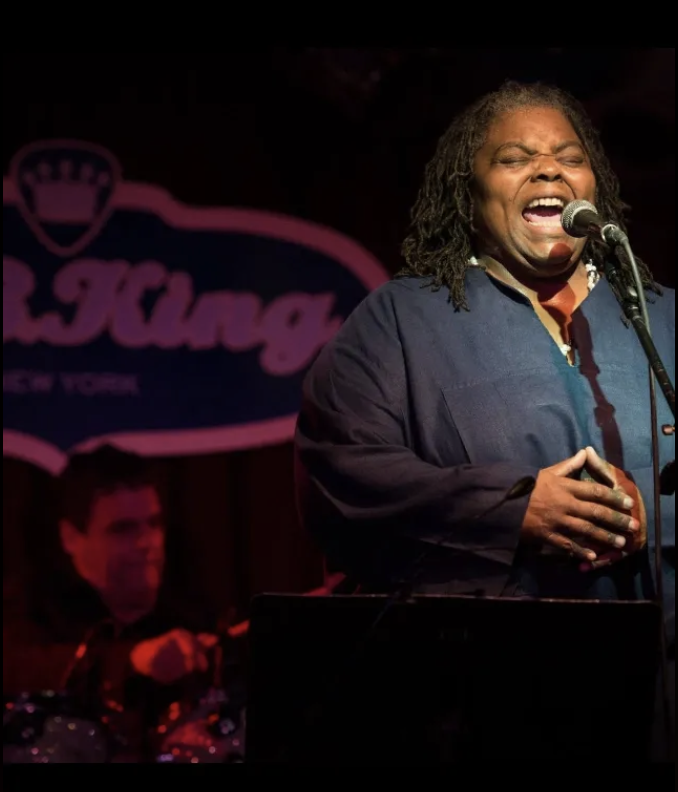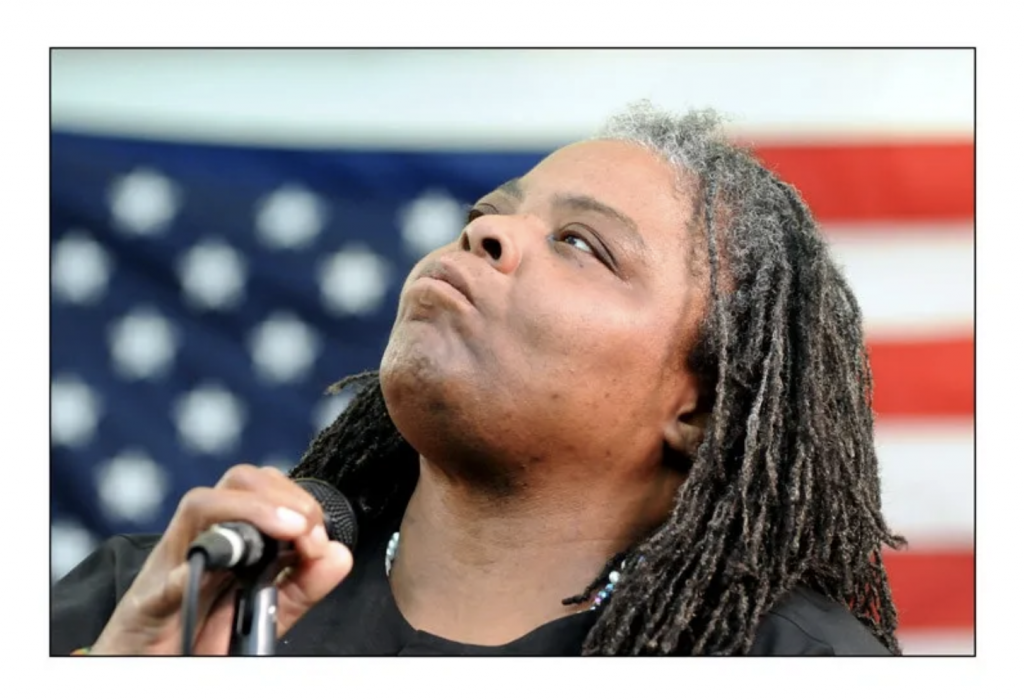Like her music, Alexis P. Suter is delicious but with a crust. Bite through that crust and you discover a warm and caring person who touches deeply every soul she addresses.
She has a few upcoming American stops and then tours France in April.
Alexis talks about the time she got to talk to one of her mentors, the legendary blues singer Ruth Brown whose success jumpstarted Atlantic Records before they got huge with Led Zeppelin.
“‘Miss Brown, my name is Alexis P. Suter. I was a great fan of yours. I just want to say thank you. I don’t know if anyone ever said that to you, but you have been a big influence in my life.’
“She started asking me questions, and she said, ‘I can hear it in your voice. You can sing; I KNOW you can sing.’”
Alexis’s biography now is a match for that of Ruth Brown. She is the last of five children born to a mother who toured the country singing with Thomas Dorsey who wrote “Precious Lord” and introduced her daughter to Clinton Utterbach, the Christian rap and gospel artist who recorded “Lord We Invite You Here.”
Now in home hospice, her mom was still playing organ in her church into her 90s. And when Alexis was young, gospel was the only music heard at home as well as in church. It was an older sister who turned her on to Creedence Clearwater Revival, America, and Cream. It fundamentally blew her mind, not enough to abandon her faith completely, but it certainly changed her view of organized religion.
In 2014 she told me that her first exposure to secular music was a Christopher Columbus awakening. “I knew at that moment the world was not flat. There’s plenty of music to go around.” At the time she said, “Religion is for people who are afraid of going to hell, and spiritualists are people who have already been there.
“I’ve grown up in the church all my life, and a lot of different pastors have used the Bible as a weapon. Why would God create me in his image to condemn me to hell from birth? The God who loves me is a loving God and only wants the best for me, and if I make mistakes, it’s ok because no one is perfect.”
Today, she’s a bit more sanguine. I asked her if Christianity had helped her deal with her mother’s illness. “Yes, yes,” she said quickly, adding that she would never put her in a nursing home. “We have a lot of help. My mother has a 24-hour home assistant. We have some awesome home attendants who keep my mother clean and make sure everything is in the proper perspective. You know, I really don’t have any complaints. I mean everybody does what they have to do to make my mother comfortable.”
The highlights of Alexis’ live performances today are her renditions of “Let It Be” and “Knocking on Heaven’s Door” that are so profoundly moving that you forget that Dylan wrote one and The Beatles wrote the other. She has always moved fluidly from spirituals to secular music, blues to soul, house music to pop. Whatever she sings, Alexis’s deep baritone voice cuts an imposing, almost monolithic figure.
Levon Helm discovered her at a benefit concert where they both performed. Her band played 98 times at the late Levon Helm’s vaunted Saturday night Rambles in his Woodstock barn. More than any other act. “He always wanted us to open up for them because we got the crowd ready for them,” said Alexis in 2014 with justifiable pride. “A woman told us one time, ‘Out of all the bands that come to the Ramble, if this Ramble was to stop right now, Levon knows you guys can take it to the next level. You don’t have to depend on Levon to take it to the next level because you already have what it takes.’ So, we took that advice and always stayed in contact with Levon, and half the time he knew what we were doing before we did.”
Today she still reflects back on her times at the Midnight Rambles with fond memories. “Levon had a very big heart. He had a cake that was designed as a drum set, and he packed it up and said, ‘Give this to your mother. Take it to the church.’ Because on Sunday at the service they would go downstairs and have coffee. So, he said, ‘You give that to your mother. Tell her to enjoy this cake.’
“He always looked out for me. I said, ‘Levon, I want to thank you.’ He said, ‘Don’t thank me. If you didn’t sound the way you sound, you wouldn’t be there.’ He loved my mother. After I’d get home, mother would say ‘Oh, I just got off the phone with Levon.’ He would call all the time. One night I went backstage to Levon’s place, and he sat me down. He went into his pocket and pulled out $800. He said, ‘Give this to your mother. Tell her to pray for us. And you can tell her what to put in the magazine.’ It was a full-page ad for The Ramble, and it was a full page ad for the Alexis P. Suter Band.”

Alexis is a product of four different musical cultures. Whether it’s gospel, dance, blues or Woodstock jams, the one consistent element in this woman’s repertoire is the desire to keep it real. She’s very emotional, talks like a preacher in full sermonizing mode and creates music that is bigger than life. She became the first African American woman signed to Epic Sony Japan and had a number one dance hit in the ’90s called “Slam It, Baby.”
She went on to work with the eclectic Hipbone label where she released a blues album called Suga Fix. “I’m telling you, sometimes I’m in a total trance,” she told me in 2007. “A lot of people don’t understand that because I am really singing my life. If you knew the life I’ve had up till this point… I had a rough time when I was a kid. It had nothing to do with my parents. It was just that I was hot-headed. And my music is what saved my life.
When I’m singing to somebody, I get emotional when I talk to people. So, if I’m singing it and giving it all that I’ve got and I’m trying to relay to people, ‘This is who I am. This is what I did, what I’ve done. This is what I do.’ I mean, it’s an emotional and spiritual feeling for me. It really is, and this music has saved my life. My church has saved my life.”
Some things haven’t changed much since that 2007 interview. Then she said, “It’s like, come on, guys. Let’s get it together. Let’s do this. When I look out in the audience, and I don’t see a lot of people from my culture, it saddens me because I know that we’ve contributed so much to this genre of music as well as other music, but the blues, the swamp music, the backwoods, I don’t understand. This music has come from slavery when they were beating drums to relay messages. That was the blues, baby. That was the blues. We’re gonna meet by the river. Harriet Tubman is coming. Education is definitely the key. See, I don’t know what happened. I can’t speak for everybody.”
Alexis plays Caffe Lena in Saratoga, New York on February 23rd. In April she does a series of dates in France. In Europe she’s a sensation. “We’ve done all of northern Italy. We’ve played churches that ain’t never had a band in ’em. That’s how popular we were. They gave us the keys to the city in Alexandria. It was beautiful, but you know we’re going to France. It’s after the pandemic, and I think it’s gonna make some noise. (chuckle) I’m really looking forward to it.”
When I asked her if she would do “Let It Be” and “Knockin’ on Heaven’s Door” at Lena’s, Alexis’s answer was an emphatic yes. I told her I was sure she’d put her heart and soul into it.
“I put my heart into it every time.”


